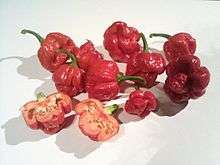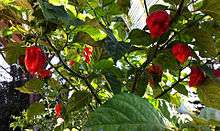Trinidad moruga scorpion
| Trinidad moruga scorpion | |
|---|---|
 | |
| Species | Capsicum chinense |
| Origin | Moruga, Trinidad and Tobago |
| Heat |
|
| Scoville scale | 1,200,000 on average. SHU |
The Trinidad moruga scorpion (Capsicum chinense) is native to the district of Moruga in Trinidad and Tobago. On February 13, 2012, New Mexico State University's Chile Pepper Institute identified the Trinidad moruga scorpion as the hottest chili in the world, with a mean heat of more than 1.2 million Scoville heat units (SHUs) and individual plants with a heat of more than 2 million SHUs.[1] According to the Chile Pepper Institute, the previous record holder was the bhut jolokia of India as they never accepted the Infinity chili and Naga Viper pepper that were previous record holders per Guinness World Records. The current world record holder is the Carolina Reaper with 1.57 million SHU.
Overview

The Trinidad Moruga Scorpion was created by Wahid Ogeer of Trinidad.[2]
Paul Bosland, a chili pepper expert and director of the Chile Pepper Institute, said, "You take a bite. It doesn't seem so bad, and then it builds and it builds and it builds. So it is quite nasty."[3]
Aside from the heat, the Trinidad moruga scorpion has a tender fruit-like flavor, which makes it a sweet-hot combination.[4] The pepper can be grown from seeds in most parts of the world. In North America, the growing season varies regionally from the last spring hard frost to the first fall hard frost. Freezing weather ends the growing season and kills the plant, but otherwise they are perennials which grow all year, slowing in colder weather.
See also
References
- ↑ Justin Bannister (2012-02-13). "NMSU's Chile Pepper Institute names the Trinidad Moruga Scorpion hottest pepper on earth". Retrieved 2013-11-26.
- ↑ Charles Kong Soo (February 14, 2016). "Cut out the middleman, help people earn $$". The Trinidad Guardian. Retrieved February 14, 2016.
- ↑ Susan Montoya Bryan (February 15, 2012). "Chile experts: Trinidad Moruga Scorpion is hottest". Associated Press. Retrieved November 26, 2013.
- ↑ Joshi, Monika (2012-03-11). "Chile Pepper Institute studies what's hot". Your life. USA Today. Archived from the original on 2012-03-12.